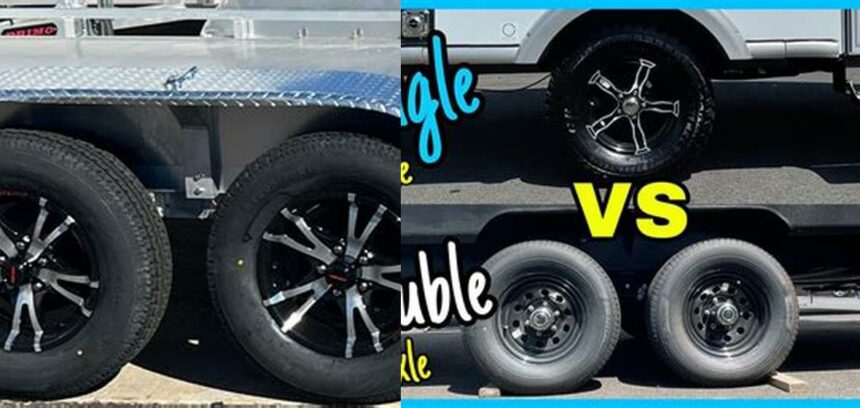Is a single or double axle trailer better: Are you pondering the age-old question of whether a single or double axle trailer is better for your needs? Strap in, because we’re about to embark on a journey through the world of trailers. From understanding the basics of axles to exploring the real-world applications, we’ll weigh the pros and cons to help you make an informed choice. Whether you’re a seasoned hauler or a newbie to the trailer game, let’s unravel the mystery of single vs dual axle trailers and find out which one reigns supreme.
Understanding Axles in Trailers
Before delving into the heart of the debate on whether a single or double axle trailer is better, it’s crucial to comprehend what an axle is. An axle is a central shaft for a rotating wheel or gear. In the context of trailers, axles are pivotal in distributing the weight of the load and ensuring a smooth ride.
Differences Between Single and Dual Axle Trailers
The primary difference between a single and a dual axle trailer lies in the number of axles, which consequently affects the trailer’s weight capacity, stability, and maneuverability. Single axle trailers have one set of wheels, while dual axle trailers have two sets.
Pros and Cons of a Single Axle Trailer
When considering a single axle trailer, it’s essential to weigh its advantages and disadvantages in your decision-making process.
Pros of a Single Axle Trailer
- Lighter Weight: Single axle trailers are inherently lighter, making them easier to tow for vehicles with lower towing capacities.
- Lower Cost: Generally, they are more budget-friendly, both in upfront costs and long-term expenses such as registration and insurance fees.
- Less Maintenance: With fewer tires and brakes to maintain, single axle trailers require less upkeep.
- Easier to Maneuver: Their compact size makes them more maneuverable, especially in tight spaces or when reversing.
- Better Fuel Economy: Due to their reduced weight, they offer better fuel efficiency, a boon for long-distance travels.
- More Nimble Off-Road: The lighter and more compact nature of single axle trailers makes them better suited for off-road adventures.
Cons of a Single Axle Trailer
However, single axle trailers come with their set of limitations. The reduced weight distribution and stability can affect the towing experience, particularly at higher speeds or in adverse weather conditions. They also have a lower weight capacity, which limits the amount of cargo they can legally and safely carry.
Exploring the Advantages of Dual Axle Trailers
Dual axle trailers offer distinct benefits that cater to different needs and scenarios. One of the most significant advantages is braking performance. With more wheels, dual axle trailers typically provide better braking, especially important for heavier loads. This is critical for safety, as the additional brakes help in controlling the trailer during descents and emergency stops.
Single vs Dual Axle Trailers: Which is Better for You?
Deciding between a single or dual axle trailer hinges on your specific requirements. If fuel efficiency is a top priority and you plan to navigate through challenging terrains, a single axle trailer might be your best bet. Conversely, if your focus is on stability, braking performance, and carrying heavier loads, a dual axle trailer would be the more suitable option.
Real-World Applications: Single vs Dual Axle Trailers
Consider a scenario where you frequently transport heavy construction materials. A double axle trailer would be a prudent choice due to its enhanced weight distribution and stability. On the other hand, if you’re a weekend warrior heading out for quick getaways with light gear, a single axle trailer would suffice, offering ease of handling and cost savings.
Cost Considerations and Maintenance in the Long Run
Cost is a decisive factor for many trailer owners. While single axle trailers are cheaper upfront, dual axle trailers may offer better value in the long run, considering their durability and the capability to handle more substantial loads without compromising safety.
Conclusion: Making the Informed Choice
Ultimately, the choice between a single or double axle trailer should align with your towing habits, budget, and the nature of your cargo. While each has its pros and cons, the decision should be based on a careful assessment of your needs, ensuring a balance between performance, safety, and economics.
For further insights, readers are encouraged to explore additional resources such as The RV Geeks and Trailer Superstore to make a well-informed decision tailored to their unique towing requirements.
What is the difference between a single axle and a dual axle trailer?
A single axle trailer has one set of wheels, while a dual axle trailer has two sets of wheels.
What are the pros and cons of a single axle trailer?
Pros: Lighter weight, lower cost, less maintenance, easier to maneuver, better fuel economy, and more nimble off-road.
Cons: Potentially less stability and weight distribution compared to a dual axle trailer.
Is a single axle or double axle trailer better for fuel efficiency?
A single axle trailer is better for fuel efficiency as it is lighter and requires less power to tow.
What are the cost considerations when choosing between a single axle and a dual axle trailer?
Generally, single axle camper trailers are less expensive than their dual axle counterparts.
Which type of trailer offers better braking performance?
A double axle trailer typically offers better braking performance due to enhanced stability and weight distribution.







